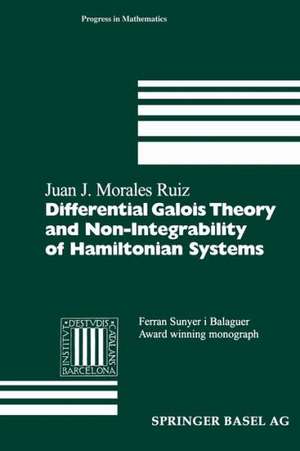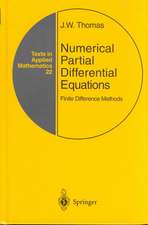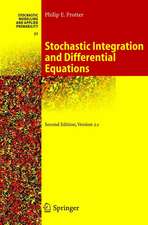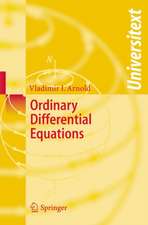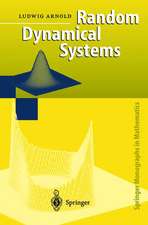Differential Galois Theory and Non-Integrability of Hamiltonian Systems: Progress in Mathematics, cartea 179
Autor Juan J. Morales Ruizen Limba Engleză Paperback – 26 oct 2012
The book is based on the original joint research of the author with J.M. Peris, J.P. Ramis and C. Simó, but an effort was made to present these achievements in their logical order rather than their historical one. The necessary background on differential Galois theory and Hamiltonian systems is included, and several new problems and conjectures which open new lines of research are proposed.
- - -
The book is an excellent introduction to non-integrability methods in Hamiltonian mechanics and brings the reader to the forefront of research in the area. The inclusion of a large number of worked-out examples, many of wideapplied interest, is commendable. There are many historical references, and an extensive bibliography.
(Mathematical Reviews)
For readers already prepared in the two prerequisite subjects [differential Galois theory and Hamiltonian dynamical systems], the author has provided a logically accessible account of a remarkable interaction between differential algebra and dynamics.
(Zentralblatt MATH)
| Toate formatele și edițiile | Preț | Express |
|---|---|---|
| Paperback (2) | 381.81 lei 6-8 săpt. | |
| Springer – 26 oct 2012 | 381.81 lei 6-8 săpt. | |
| Springer – 18 dec 2013 | 381.81 lei 6-8 săpt. |
Din seria Progress in Mathematics
- 24%
 Preț: 691.37 lei
Preț: 691.37 lei - 24%
 Preț: 740.80 lei
Preț: 740.80 lei - 9%
 Preț: 763.33 lei
Preț: 763.33 lei -
 Preț: 308.20 lei
Preț: 308.20 lei - 20%
 Preț: 695.88 lei
Preț: 695.88 lei -
 Preț: 362.51 lei
Preț: 362.51 lei -
 Preț: 308.13 lei
Preț: 308.13 lei - 18%
 Preț: 749.27 lei
Preț: 749.27 lei - 9%
 Preț: 766.42 lei
Preț: 766.42 lei - 20%
 Preț: 631.09 lei
Preț: 631.09 lei - 24%
 Preț: 638.88 lei
Preț: 638.88 lei - 15%
 Preț: 580.82 lei
Preț: 580.82 lei -
 Preț: 392.37 lei
Preț: 392.37 lei -
 Preț: 395.09 lei
Preț: 395.09 lei -
 Preț: 390.25 lei
Preț: 390.25 lei -
 Preț: 376.80 lei
Preț: 376.80 lei - 18%
 Preț: 729.53 lei
Preț: 729.53 lei - 15%
 Preț: 652.49 lei
Preț: 652.49 lei - 15%
 Preț: 649.22 lei
Preț: 649.22 lei - 18%
 Preț: 897.95 lei
Preț: 897.95 lei -
 Preț: 385.08 lei
Preț: 385.08 lei -
 Preț: 391.02 lei
Preț: 391.02 lei -
 Preț: 378.54 lei
Preț: 378.54 lei - 15%
 Preț: 531.59 lei
Preț: 531.59 lei - 15%
 Preț: 642.83 lei
Preț: 642.83 lei - 15%
 Preț: 650.69 lei
Preț: 650.69 lei -
 Preț: 381.21 lei
Preț: 381.21 lei -
 Preț: 392.37 lei
Preț: 392.37 lei -
 Preț: 398.53 lei
Preț: 398.53 lei - 15%
 Preț: 699.28 lei
Preț: 699.28 lei -
 Preț: 416.92 lei
Preț: 416.92 lei -
 Preț: 385.84 lei
Preț: 385.84 lei - 18%
 Preț: 902.65 lei
Preț: 902.65 lei - 18%
 Preț: 802.28 lei
Preț: 802.28 lei - 15%
 Preț: 640.06 lei
Preț: 640.06 lei - 18%
 Preț: 1129.83 lei
Preț: 1129.83 lei
Preț: 381.81 lei
Nou
Puncte Express: 573
Preț estimativ în valută:
73.06€ • 78.13$ • 60.92£
73.06€ • 78.13$ • 60.92£
Carte tipărită la comandă
Livrare economică 18 aprilie-02 mai
Preluare comenzi: 021 569.72.76
Specificații
ISBN-13: 9783034897419
ISBN-10: 3034897413
Pagini: 184
Ilustrații: XIV, 167 p. 5 illus.
Dimensiuni: 155 x 235 x 10 mm
Greutate: 0.27 kg
Ediția:1999
Editura: Springer
Colecția Birkhäuser
Seria Progress in Mathematics
Locul publicării:Basel, Switzerland
ISBN-10: 3034897413
Pagini: 184
Ilustrații: XIV, 167 p. 5 illus.
Dimensiuni: 155 x 235 x 10 mm
Greutate: 0.27 kg
Ediția:1999
Editura: Springer
Colecția Birkhäuser
Seria Progress in Mathematics
Locul publicării:Basel, Switzerland
Public țintă
ResearchCuprins
1 Introduction.- 2 Differential Galois Theory.- 2.1 Algebraic groups.- 2.2 Classical approach.- 2.3 Meromorphic connections.- 2.4 The Tannakian approach.- 2.5 Stokes multipliers.- 2.6 Coverings and differential Galois groups.- 2.7 Kovacic’s algorithm.- 2.8 Examples.- 3 Hamiltonian Systems.- 3.1 Definitions.- 3.2 Complete integrability.- 3.3 Three non-integrability theorems.- 3.4 Some properties of Poisson algebras.- 4 Non-integrability Theorems.- 4.1 Variational equations.- 4.2 Main results.- 4.3 Examples.- 5 Three Models.- 5.1 Homogeneous potentials.- 5.2 The Bianchi IX cosmological model.- 5.3 Sitnikov’s Three-Body Problem.- 6 An Application of the Lamé Equation.- 6.1 Computation of the potentials.- 6.2 Non-integrability criterion.- 6.3 Examples.- 6.4 The homogeneous Hénon-Heiles potential.- 7 A Connection with Chaotic Dynamics.- 7.1 Grotta-Ragazzo interpretation of Lerman’s theorem.- 7.2 Differential Galois approach.- 7.3 Example.- 8 Complementary Results and Conjectures.- 8.1 Two additional applications.- 8.2 A conjecture about the dynamic.- 8.3 Higher-order variational equations.- A Meromorphic Bundles.- B Galois Groups and Finite Coverings.- C Connections with Structure Group.
Recenzii
"...[an] account of recent work of the author and co-workers on obstructions to the complete integrability of complex Hamiltonian systems. The methods are of considerable importance to practitioners... The book provides all the needed background...and presents concrete examples in considerable detail... The final chapter...includes a fascinating account of work-in-progress by the author and his collaborators... Of particular interest...is the program of extending the differential Galois theory to higher-order variational equations... [an] excellent introduction to non-integrability methods in Hamiltonian mechanics [that] brings the reader to the forefront of research in the area. The inclusion of a large number of worked-out examples, many of wide applied interest, is commendable. There are many historical references, and an extensive bibliography."
--Mathematical Reviews
--Mathematical Reviews
Notă biografică
Juan J. Morales Ruiz is Professor at the Universidad Politécnica de Madrid, Spain.
Textul de pe ultima copertă
This book is devoted to the relation between two different concepts of integrability: the complete integrability of complex analytical Hamiltonian systems and the integrability of complex analytical linear differential equations. For linear differential equations, integrability is made precise within the framework of differential Galois theory. The connection of these two integrability notions is given by the variational equation (i.e. linearized equation) along a particular integral curve of the Hamiltonian system. The underlying heuristic idea, which motivated the main results presented in this monograph, is that a necessary condition for the integrability of a Hamiltonian system is the integrability of the variational equation along any of its particular integral curves. This idea led to the algebraic non-integrability criteria for Hamiltonian systems. These criteria can be considered as generalizations of classical non-integrability results by Poincaré and Lyapunov, as well as more recent results by Ziglin and Yoshida. Thus, by means of the differential Galois theory it is not only possible to understand all these approaches in a unified way but also to improve them. Several important applications are also included: homogeneous potentials, Bianchi IX cosmological model, three-body problem, Hénon-Heiles system, etc.
The book is based on the original joint research of the author with J.M. Peris, J.P. Ramis and C. Simó, but an effort was made to present these achievements in their logical order rather than their historical one. The necessary background on differential Galois theory and Hamiltonian systems is included, and several new problems and conjectures which open new lines of research are proposed.
- - -
The book is an excellent introduction to non-integrability methods in Hamiltonian mechanics and brings the reader to the forefront of research in the area. The inclusion of a large number of worked-out examples, many of wideapplied interest, is commendable. There are many historical references, and an extensive bibliography.
(Mathematical Reviews)
For readers already prepared in the two prerequisite subjects [differential Galois theory and Hamiltonian dynamical systems], the author has provided a logically accessible account of a remarkable interaction between differential algebra and dynamics.
(Zentralblatt MATH)
The book is based on the original joint research of the author with J.M. Peris, J.P. Ramis and C. Simó, but an effort was made to present these achievements in their logical order rather than their historical one. The necessary background on differential Galois theory and Hamiltonian systems is included, and several new problems and conjectures which open new lines of research are proposed.
- - -
The book is an excellent introduction to non-integrability methods in Hamiltonian mechanics and brings the reader to the forefront of research in the area. The inclusion of a large number of worked-out examples, many of wideapplied interest, is commendable. There are many historical references, and an extensive bibliography.
(Mathematical Reviews)
For readers already prepared in the two prerequisite subjects [differential Galois theory and Hamiltonian dynamical systems], the author has provided a logically accessible account of a remarkable interaction between differential algebra and dynamics.
(Zentralblatt MATH)
Caracteristici
Award-winning monograph of the Ferran Sunyer i Balaguer Prize 1998 Well-balanced exposition addressing the relation between two different concepts of integrability Proposes problems and conjectures which open new lines of research Includes supplementary material: sn.pub/extras
